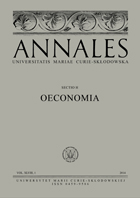Economic Growth in the European Union: The Importance of Renewable Energy Consumption
Economic Growth in the European Union: The Importance of Renewable Energy Consumption
Author(s): Krzysztof Firlej, Mateusz Mierzejewski, Marcin StanuchSubject(s): National Economy, Supranational / Global Economy, Energy and Environmental Studies
Published by: Wydawnictwo Naukowe Uniwersytetu Marii Curie-Sklodowskiej
Keywords: impact of RES; GDP; regression analysis; RES in the European Union;
Summary/Abstract: Theoretical background: The studies on the links between renewable energy consumption and economic growth are of great interest. A search of the literature on the subject reveals a diversity of studies in many respects, including but not limited to the search for a unidirectional or reciprocal relationship. The results of the studies often vary depending on the research method used and the period of analysis, which determines subsequent attempts to understand the issue.Purpose of the article: The aim of this article is to determine the relationship between the consumption of renewable energy sources and economic growth in European Union member states between 2004 and 2020. Research methods: The study was based on the data from the Eurostat database for the period 2004–2020. The study made use of data normalization using the min-max method. The linear regression method was used to assess the relationship between GDP per capita and the electricity indicators available for final consumption and renewable energy sources.Main findings: The study did not find a significant trend between renewable energy consumption and economic growth. However, this fact cannot be taken as establishing the absence of a relationship between the two indicators. Although no strong correlation was observed, some interactions are visible depending on the EU member state, which entitles us to partially confirm the research hypothesis. The differences between the groups of EU-15 and EU-10 countries are not distinct, and extending the set of monitored variables (i.e. carrying out modelling for EU-27 countries) does not have a significant impact on the results of the study, which are similar.
Journal: Annales Universitatis Mariae Curie-Skłodowska, Sectio H Oeconomia
- Issue Year: LVIII/2024
- Issue No: 1
- Page Range: 95-109
- Page Count: 15
- Language: English

